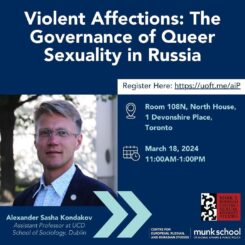Violent Affections: The Governance of Queer Sexuality in Russia

In-person | March 18, 2024 | 11:00AM – 1:00PM
This event will take place in-person at Room 108N, North House, 1 Devonshire Place, Toronto, ON, M5S 3K7
This presentation discusses social and political effects of the regulation of queer sexuality, paying particular attention to the case of Russia where the “gay propaganda” law (2013) is but one example of instrumentalization of homophobia. First, I set out intellectual tasks for what I call a “queerer criminology”. Since queer criminology simply puts LGBTQ+ subjects at the centre of its inquiry, it lacks ambition of other queer projects which claim to be transgressive and transformative. I argue for the next step to make this branch of criminology queerer. Second, I offer my analysis of more than 300 court rulings of anti-queer violence in Russia on which my book Violent Affections is based. In this analysis I reveal currents of affectionate power relations that manipulate people’s emotions for political gains and control. Hence, third, I aim to find frameworks which would enrich our understanding of crime, Russian politics, and the regulation of sexuality. My ultimate example deals with the amendment of the “gay propaganda” law in 2022 as a means of war effort in Russia’s full-scale invasion of Ukraine.
Alexander Sasha Kondakov, PhD, is an assistant professor at the School of Sociology, University College Dublin, Ireland. His truly international experience includes holding positions in the University of Helsinki in Finland, European University at St. Petersburg Russia, Woodrow Wilson Center for Scholars in Washington DC, and the University of Wisconsin-Madison in the United States. Kondakov’s work is primarily focused on law and queer sexualities. His latest research on anti-queer violence concluded with an open-access book ‘Violent Affections: Queer sexuality, techniques of power, and law in Russia’.
Co-Sponsor: Centre for European, Russian, and Eurasian Studies Co-Sponsor: Bonham Centre for Sexual Diversity Studie

